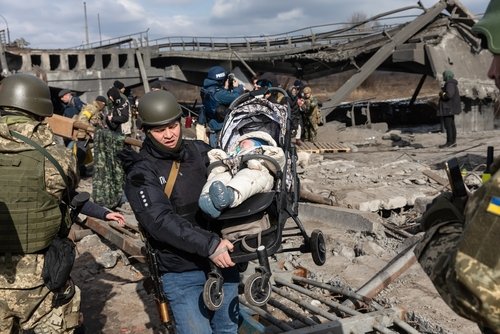Belgium (Brussels Morning Newspaper) German Chancellor Olaf Scholz spoke to Russian President Vladimir Putin by phone on Tuesday, urging the Russian leader to find a diplomatic solution to the ongoing war in Ukraine, which should be based on a ceasefire and a complete withdrawal of Russian troops from the country as soon as possible.
Scholz spoke with Putin for about 90 minutes, discussing primarily the subject of the Russian invasion of Ukraine. According to German government spokesperson Steffen Hebestreit, Scholz emphasised the need to ensure the safety of the Zaporizhia nuclear power plant in Ukraine, currently occupied by Russian troops despite demands by the UN’s nuclear energy watchdog to demilitarise the facility.
Hebestreit also said that Scholz appealed to the Russian leader to continue with full implementation of the Ukrainian grain export agreement, a deal to let cargo ships leave Ukrainian ports with the country’s grain exports in tow, which is backed by the United Nations.
Scholz also reportedly warned Russia not to go forward with any attempts to hold referendums in occupied territories on joining with the Russian Federation. “The Federal Chancellor emphasised that any further Russian annexation steps would not go unanswered and would not be recognized under any circumstances,” said Hebestreit in an official statement. According to the German government, the two leaders agreed they would remain in contact.
Russian view
The Russian government was much less verbose in its recount of the discussion, with the TASS agency reporting merely that “Putin discussed situation around Zaporizhia NPP with Germany’s Scholz.” According to the official Kremlin account of the talk, Putin told Scholz that Ukraine is committing “egregious violations of international humanitarian law”. Moscow also felt compelled to emphasise how Russia is providing Ukrainian prisoners of war with access to the International Committee of the Red Cross, while claiming that Kyiv does not.
The talk between the two leaders came as Russian forces were largely routed in the north of Ukraine, following a surprisingly successful counter-offensive by Kyiv in the Kharkiv region. Expert think-tanks such as ISW stress that the Ukrainian successes could be impacting the will or ability of the Russian military command to use newly formed volunteer units in Ukraine in a timely fashion.
The pressure on Moscow-installed local governments has also reportedly made it effectively unfeasible to implement planned annexation referendums, with multiple sources claiming that Moscow has now decided to postpone such referendums indefinitely.
The International Atomic Energy Agency (IAEA), which now has ground observers at the Zaporizhia nuclear power plant, has reported on Monday that the second reserve power line has been restored, somewhat bringing down the risk of a potential meltdown caused by cooling failure.
Despite repeated UN calls for Russian troops to leave the power plant out of regard for its safety, Moscow has effectively weaponized the nuclear facility by occupying it and using it as an artillery base for shelling Ukrainian positions, in effect using the sensitive equipment on site as a shield against retribution.




